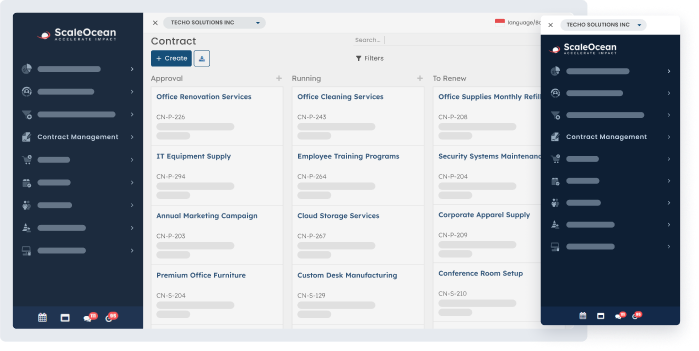For every company, it is very important to safeguard the operational interests of clients and ensure the smooth running of the business as a whole. That is why it is important to have contract management so that every work process is easily communicated, and make better business decisions.
Moreover, for many Singaporean companies with high business development, manual contract management will waste a lot of time, and the risk of errors such as misplaced documents, missed deadlines, and inconsistent contract terms can seriously damage your company’s profitability and reputation.
This is where contract management comes into play. Contract management is a process that involves monitoring contracts, deliverables, deadlines, terms, and requirements while maintaining customer satisfaction. Both public and private agencies understand that the purchasing process continues even after a contract is awarded.
In this article, we will outline what contract management is, why it is important for business success, and the step-by-step process involved. We will also discuss how implementing digital solutions can streamline contract management, saving you from administrative hassles and compliance risks.
- Contract management is the process of managing contracts through their lifecycle, ensuring deadlines are met, terms are fulfilled, and risks are minimized.
- For businesses in Singapore, contract management ensures compliance, optimizes cash flow, tracks deadlines, and reduces risks like missed renewals or legal disputes.
- Best practices in contract management include centralized storage, automated reminders, regular audits, standardized templates, and clear approval workflows for efficiency.
- ScaleOcean is a contract management software that centralizes contracts, automates tracking, ensures compliance, and boosts efficiency with user-friendly tools and real-time insights.
What is Contract Management?
Contract management is the process of managing contracts throughout their lifecycle. This includes creation, negotiation, execution, compliance, renewal, and ensuring terms and conditions are met. Its role is critical to ensuring that both parties adhere to their obligations and that risks are minimized.
Effective contracts management often intersects with human resource management, particularly when handling employee agreements, vendor contracts, or compliance-related documentation. Think of contract management as the unsung hero in your business toolkit, ensuring that deals don’t slip through the cracks and that you can confidently manage your obligations.
And let’s be honest—wouldn’t you rather spend your time growing your business than chasing down forgotten paperwork? By managing contracts effectively, you can focus on what matters: running a successful and stress-free business!

Why is Contract Management Important for Businesses?
Contract management is a critical business function that can break your operations. Manual contract managements risks getting lost, missing important opportunities, or even making mistakes that result in a breach of terms. That’s why technology is important to automate all aspects of contract management.
Missed deadlines, overlooked clauses, and misplaced contracts can lead to costly penalties, strained business relationships, and even legal disputes. A study by the WCC reveals that businesses lose an average of 9.2% of their yearly revenue due to poor contracts management. These are the consequences of letting contracts slip through the cracks.
By contrast, effective contract management ensures that every agreement is tracked, deadlines are met, and terms are adhered to. It’s about staying on top of your commitments while minimizing risks, which ultimately protects your business’s reputation and bottom line. In today’s fast-paced business environment, where every missed renewal or overlooked obligation could cost you a valuable deal, the urgency of managing contracts well cannot be overstated.
So, why is contract management important for businesses? It’s the safety net that keeps your agreements on track and ensures that you’re meeting obligations while maximizing profits. And let’s face it—no one wants to be the company that missed a million-dollar deal just because someone misplaced a contract, right?
Functions of Contract Management in Singapore Companies
Contract management ensures smooth and secure transactions between all parties involved. The process will protect the interests of keeping obligations on track, and optimize the performance of each agreement you sign. However, contract management brings several specific functions for your business:
1. Stay Ahead by Tracking Deadlines and Renewals
Contracts often come with expiration dates or renewal periods. Contracts management software guarantees that you never overlook these important deadlines.
For instance, if you’ve leased an office in the central business district (CBD) of Singapore, and the lease is set to expire in six months, automated reminders can ensure you’re prepared for renewal negotiations in advance. Without it, you risk missing renewal deadlines, which could result in increased rent or losing the space to another tenant.
2. Ensure Compliance to Avoid Legal Risks
Contracts often contain legal obligations that businesses must adhere to, such as compliance with industry standards, environmental regulations, or employee rights. Effective contracts management ensures you don’t overlook these clauses.
For example, if you’ve entered into a contract with a supplier that requires compliance with Singapore’s stringent environmental regulations, failing to meet those standards could result in penalties or contract termination. Contract management keeps you in line, avoiding costly consequences.
3. Streamline Negotiations for Better Deals
Every business negotiation is about leveraging past knowledge to secure better deals. Contract management helps by keeping a history of all your agreements, enabling you to use past data in future negotiations, including insights into expenses like construction costs or logistics fees.
Let’s say you’ve been working with a logistics provider for several years and want to renew the contract. By analyzing previous agreements, you might notice areas where you can negotiate better terms, such as volume discounts or faster delivery schedules.
4. Manage Risks to Protect Your Business
Contracts can carry financial and operational risks, such as delayed payments, failure to meet obligations or unexpected costs. Contracts management helps you identify potential risks and build contingencies into your agreements.
For instance, if a client has a history of delayed payments, you can include stricter payment terms in your next contract, such as late fees or shorter payment deadlines. This reduces the likelihood of interruptions to cash flow.
5. Optimize Cash Flow Through Efficient Payment Tracking
Contracts are directly linked to your business’s financial health. By managing payment schedules, contracts management ensures that you’re receiving payments on time and not facing delays that could impact cash flow.
For example, if you provide services to a customer with a long payment cycle, contract management can help you adjust the terms of future agreements to include earlier payment deadlines, keeping your cash flow steady and predictable.
By managing these functions effectively, contracts management enhances business efficiency, reduces risks, and strengthens your overall contract performance. Ultimately, it allows you to focus on growth, knowing that your agreements are fully optimized.
Contract Lifecycle Management Process
The Contract Lifecycle Management (CLM) process refers to a systematic approach to managing contracts from their creation through execution, compliance, and renewal or termination. This process ensures that all contractual obligations are met, deadlines are tracked, and the business remains compliant.
By following the CLM process, companies can avoid common issues like missed deadlines, compliance risks, or disputes. Below are the eight essential steps in the CLM process, along with the problems you might face and solutions to streamline the process.
1. Initiation
In this first step, the contract need is identified, and the initial request for a contract is made. Businesses should clearly outline their objectives, terms, and the parties involved. A frequent problem here is a lack of clarity, which can lead to misaligned goals or expectations later on.
For example, if you’re engaging with a new supplier, you need to clarify delivery expectations and payment terms upfront. To prevent misunderstandings, clearly document all requirements and make sure that all stakeholders are aligned before proceeding.
2. Authoring
Once the need is defined, the contract is drafted. This involves writing all the terms, conditions, responsibilities, and legal clauses that will govern the relationship between the parties. Without proper expertise, poorly written contracts can create loopholes or ambiguities.
For example, leaving vague terms in payment timelines can cause disputes. The solution is to standardize the drafting process by using legal templates or contract administration and management software, which ensures consistent and clear language across contracts. Involving legal teams early on is also key to avoiding costly errors.
3. Negotiation
At this stage, both parties review the drafted contract and propose adjustments. Negotiation can involve altering terms such as payment, delivery timelines, or performance obligations. A common challenge here is the risk of prolonged negotiations due to conflicting interests, leading to delays.
For example, if a vendor insists on extending payment terms, this can slow down finalization. The solution is to set clear timelines for negotiations and use contracts management tools that allow real-time collaboration and tracking of revisions. This ensures that both parties are aware of changes and that discussions stay focused.
4. Approval
Once the contract terms are agreed upon, it goes through an approval process. Depending on the organization, multiple stakeholders—such as legal, finance, or senior management—might need to sign off on the agreement. The issue here is often bottlenecks caused by slow decision-making or too many approvers, which can delay the contract’s execution.
To avoid these delays, businesses should define a streamlined approval workflow, assigning specific approvers and setting deadlines for feedback. Using contract management software can automate the approval process and send reminders to stakeholders for timely responses.
5. Execution
After all necessary approvals, the contract is signed, making it legally binding. Traditionally, this stage could be slow due to the need for physical signatures or mailing documents. But in today’s digital age, these delays can be easily avoided by using e-signature tools.
For example, businesses in Singapore often face challenges getting cross-border signatures from overseas partners. E-signature platforms not only expedite the process but also ensure secure and tamper-proof document storage. This step guarantees that all parties have agreed to the terms, and the contract is now active.
Additionally, ERP systems offering e-signature integrations, like those highlighted in an ERP system demo, showcase how easily this feature can be implemented for seamless contract execution. This step guarantees that all parties have agreed to the terms, and the contract is now active.
6. Obligation Management
With the contract in effect, both parties must fulfill their obligations, such as making payments, delivering products, or meeting service level agreements (SLAs). The difficulty here lies in tracking these obligations and ensuring that no party falls behind on its commitments.
For instance, missing a delivery deadline could result in penalties. Contract administration and management software automates task reminders and sends notifications when important milestones or deliverables are due, helping businesses stay compliant and avoid financial losses.
7. Compliance and Auditing
Contracts often require businesses to meet specific legal and regulatory requirements. This stage involves regularly checking that all terms are being followed and ensuring compliance with internal policies or industry regulations. Without proper oversight, businesses may face fines or lawsuits for failing to comply with contractual or legal obligations.
To manage this, set up routine audits and compliance checks within your contract management system. Automated alerts can notify you when certain actions—such as a compliance audit or renewal review—are needed, helping you stay ahead of risks.
8. Renewal or Termination
Finally, as a contract nears its expiration, businesses must decide whether to renew, renegotiate, or terminate it. One of the biggest challenges is the risk of missing contract renewal dates, which can result in either the contract lapsing or being automatically renewed without review.
For instance, missing the renewal of a service agreement might lead to unfavorable terms continuing. A report from World Metrics reveals that 38% of businesses fail to meet contract renewal or expiration deadlines. The solution is to use contract management software that alerts you well in advance of contract end dates, so you can plan negotiations or terminations effectively.
After learning the explanation above, it’s safe to say that contract management software has a big role in simplifying and automating the entire process. By adopting a contract management system like ScaleOcean, you’re not just managing contracts more efficiently—you’re optimizing your entire operation.
Why not seize this opportunity to streamline your business? Try their free demo today and experience the difference ScaleOcean can make for your contract management needs!
Essential Elements of Contract Management
Efficient contract management goes beyond simply finalizing the signature. It’s a comprehensive process that ensures contracts are properly created, executed, and monitored, ensuring both parties meet their obligations. Several essential elements should always be in place to successfully manage contracts in a business environment.
Let’s break down these key components that will make your contracts management process seamless and efficient.
1. Clear Contract Objectives
Every contract should start with well-defined objectives. What are the goals of the agreement? Are the expectations of both parties clear? This is especially crucial when dealing with complex agreements in industries like construction, where construction ERP systems can help track and manage contract goals more efficiently.
Without a solid understanding of the purpose behind the contract, it’s easy to end up with vague terms and potential conflicts. Establishing clear objectives ensures everyone is aligned from the beginning, minimizing misunderstandings down the line.
2. Comprehensive Terms and Conditions
This is the heart of any contract. A strong contract includes all the necessary details: obligations, payment terms, delivery schedules, warranties, and penalties for non-compliance. Businesses must be thorough in defining every responsibility. Missing terms can lead to loopholes that may cause legal or financial issues. Always ensure the contract leaves no room for misinterpretation.
3. Tracking and Monitoring of Key Dates
From start dates to renewal deadlines, contracts are filled with key dates that need close attention. Forgetting these dates can lead to missed renewals, late penalties, or lost opportunities. Having a system in place to monitor deadlines is crucial. Many companies use contract administration and management software to automatically send reminders and ensure no important dates are overlooked.
4. Compliance and Legal Review
Contracts are legal documents, and failing to comply with certain terms or regulations can lead to severe consequences. A critical element of contract management is ensuring compliance with all applicable laws and industry regulations. Regular legal reviews help businesses avoid breaches of contract and ensure they remain on the right side of the law.
5. Risk Management
Every contract comes with inherent risks, whether it’s financial exposure, operational risks, or compliance risks. Effective contracts management identifies these risks early on and builds safeguards into the contract to mitigate them. This might include performance guarantees, liability limitations, or penalties for delays. Anticipating potential issues ensures you’re prepared if things don’t go as planned.
6. Communication and Collaboration
Successful contract management isn’t just about documents—it’s also about relationships. Open lines of communication between all parties ensure smoother negotiations, fewer misunderstandings, and quicker problem resolution. Regular updates and clear points of contact should be established, especially for complex, long-term contracts.
7. Efficient Approval Workflow
Managing the approval process is essential to avoid bottlenecks and delays. In many businesses, contracts must pass through several departments—legal, finance, and upper management. A streamlined workflow with clear approvers and deadlines ensures the process moves quickly without unnecessary holdups.
8. Centralized Contract Storage
Misplacing contracts or scattering them across different departments leads to chaos. A centralized storage system ensures all contracts are easily accessible, secure, and organized. Many businesses now use cloud-based contracts management systems to store, categorize, and retrieve contracts with ease.
Contract Management Best Practices
Managing contracts can be a complex process, but following best practices can help businesses stay organized, minimize risks, and ensure all parties fulfill their obligations. By adopting efficient methods, companies can streamline the contract management process and avoid costly mistakes.
Below are eight unique and proven best practices for managing business contracts efficiently.
1. Centralize Contract Storage
One of the key best practices is to store all contracts in a single, easily accessible system. Centralized storage prevents contracts from getting lost in the shuffle and ensures all stakeholders can quickly locate the necessary documents. Using cloud-based contract management software not only makes retrieval easy but also adds an extra layer of security to protect sensitive data.
2. Automate Key Date Reminders
Missing a contract renewal or payment deadline can lead to unnecessary penalties or missed business opportunities. To avoid this, automate reminders for key dates such as contract renewals, expiration, or payment milestones. Automation helps businesses stay on top of their obligations without having to manually track each deadline, saving time and preventing costly oversights.
3. Standardize Contract Templates
Using standardized contract templates ensures consistency across agreements and reduces the risk of missing important terms. This practice also speeds up the drafting process and helps ensure that all necessary legal clauses are included. Whether it’s a supplier agreement or a lease contract, a pre-approved template simplifies the workflow.
4. Involve Legal Teams Early
Waiting until the last minute to involve your legal team can lead to delays and missed critical issues. It’s essential to bring legal experts into the contract creation process early. This proactive approach helps catch potential problems before they escalate and ensures that all agreements meet legal standards from the start.
5. Track Contract Performance
Managing contracts doesn’t stop at signing. Regularly tracking contract performance is crucial to ensure that all parties are fulfilling their obligations. For instance, are suppliers delivering on time? Are payments being made according to the agreed schedule? By keeping an eye on these performance indicators, businesses can address any issues before they turn into bigger problems.
6. Create Clear Approval Workflows
A well-defined approval process is key to avoiding bottlenecks. Establish clear roles for who needs to approve contracts and set deadlines for each step. Having an efficient workflow reduces delays, ensures accountability, and moves contracts through the process quickly. Contracts management tools can automate these workflows, making the process even smoother.
7. Conduct Regular Audits
Performing regular audits of your contracts helps identify areas for improvement and ensures compliance with internal policies and industry regulations. Audits can reveal hidden risks or inefficiencies in contract terms, giving businesses the chance to renegotiate or adjust as needed. Regular reviews ensure your contracts stay up-to-date and aligned with your business goals.
8. Maintain Open Communication Channels
Communication is key in contract management. Ensuring that all parties have open channels for communication helps resolve disputes quickly and keeps the contract running smoothly. Regular updates and check-ins between involved parties also reduce misunderstandings and ensure expectations are met throughout the contract lifecycle.
By following these best practices, businesses can streamline their contracts management processes, minimize risks, and maximize value from their agreements. With a bit of planning and the right tools in place, contract management becomes a much smoother journey.
Manage Contracts Easier with ScaleOcean Contract Software
ScaleOcean’s Contract Management Software is the ideal digital tool for streamlining and automating the contracts management process. It centralizes all contracts, automates deadline tracking, and ensures compliance, helping businesses stay organized and boost performance. By reducing manual errors and providing real-time insights, ScaleOcean enhances efficiency and profitability.
To help you get started, ScaleOcean offers free demo access and consultation with their experts. This ensures you fully understand how the software can tackle your contract management challenges, giving you the confidence to integrate it into your business operations seamlessly.
What makes ScaleOcean stand out? Not only does it offer unlimited users at no additional cost, but it also supports both on-premise and cloud deployments, giving you the flexibility to choose what works best for your business. With ScaleOcean, managing contracts is easier, faster, and more secure, making it a superior choice compared to its competitors.
Here are several main features that provided in ScaleOcean Contract Management Software:
- Contract Repository: The Contract Repository centralizes all your contracts in one secure location, allowing easy access, retrieval, and organization of documents to prevent misplacement and improve operational efficiency.
- Contract Creation: The Contract Creation feature simplifies drafting by providing intuitive tools for building legally sound contracts, ensuring all necessary terms are included while reducing the time spent on manual paperwork.
- Contract Templates: Pre-built Contract Templates standardize contract formatting and clauses, ensuring consistency across agreements while speeding up the drafting process, helping businesses maintain legal compliance and reduce errors.
- Easy Tracking & Monitoring: This feature allows businesses to track key contract dates and obligations with automated reminders, ensuring deadlines are met and obligations are fulfilled, preventing missed renewals or penalties.
- Regulatory Compliance: The Regulatory Compliance feature ensures that contracts adhere to industry-specific regulations and legal standards, reducing the risk of non-compliance penalties and keeping the business in line with legal requirements.
- Access Control and Security: Access Control and Security allow businesses to assign role-based permissions to users, ensuring that sensitive contract information is only accessible to authorized personnel, enhancing document security, and reducing risks.
Conclusion
In the rapid pace of today’s business world, effective and streamlined contract management has become an essential requirement rather than a luxury. Poorly managed contracts can lead to missed opportunities, compliance risks, and operational inefficiencies.
Simplifying this process with modern technology, such as ScaleOcean Contract Management Software, empowers businesses to automate tasks, ensure compliance, and stay on top of every contract without the stress of manual oversight.
With ScaleOcean’s advanced features, managing contracts becomes easy, fast, and secure. Why wait until a missed renewal or a legal headache forces you into action? Take control now by accessing ScaleOcean’s free demo or consulting with their expert team.
It’s your opportunity to see firsthand how this cutting-edge solution can transform your contracts management process. Don’t let contracts run your business—let ScaleOcean do it for you!













 PTE LTD..png)
.png)

.png)








.png)
.png)
















